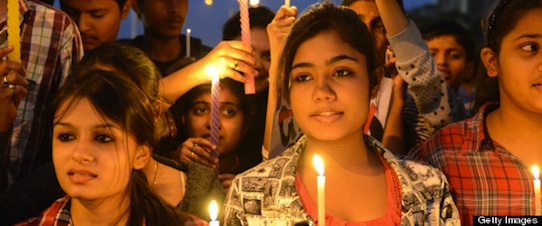

February 9, 2012 (Chennai) Boyfriend, 4 others rape 19-yr-old after spiking her drink; February 18, 2012, (Kolkata) Kolkata gang rape case: 2 arrested; May 12, 2012 Another gang rape in Hyderabad; June 20, 2012 (Mumbai) Threatening to kill her son, they gang raped her; October 21, 2012, Bangalore: 7 held in Bangalore rape case; December 16, 2012 (New Delhi) gang rape of a 23-year-old student on a city bus; December 17, 2012 (Kerala) Kerala Girl raped by brother, friend; December 21, 19-year-old allegedly gang raped by five persons; December 22, 2012, Woman stripped naked, gang raped in Tripura; December 27, 2012 (Punjab) India Teen Commits Suicide After Police Pressure Her To Drop Gang Rape Case, Marry Attacker.
A quick Google search uncovers the current and common occurrence of gang rape in India. Since the gang rape and alleged murder of a 23 year-old physiotherapist by six men on a bus, India has come out in protest. The news has been reported around the globe. What makes this gang rape different from all the others? Is it time to universally demand an end to the violent treatment of women in India and elsewhere? Are we entering an Indian Spring where drawn out abuses of women are protested around the globe until the majority rise against unacceptable violence and suppression of women?
According to the AFP, In India "official figures show that 228,650 of the total 256,329 violent crimes recorded last year were against women." India isn't the only country with shocking statistics on violence against women, but it does offer an interesting venue to analyze. Let's start with democracy.
India is the largest democracy in the world. Yet how can that be when its laws and government do not represent an entire gender? In an institutionalized rape culture there is no democracy for women. History student and deputy political editor of the University of York student newspaper, Hussein Kesvani explains:
One only has to look at the unreformed 1860 penal code that views rape as an 'outraging' of a woman's modesty, an association that immediately affiliates the female body merely as a constituent within a masculine-dominated cultural system. Additionally, the law professor Upendra Baxi noted in 2002, that the legal and political systems of India limited the abilities of females to report sexual violence, and in turn reflected a political system in which collective sexual assaults on women could go unpunished. Baxi also highlighted that police authorities often neglected, if not participated in, the phenomenon of 'eve-teasing' -- a crude form of sexual molestation that has more than quadrupled over the past decade. Indeed, despite the rapid economic prosperity India has enjoyed since its independence, little has been achieved to in terms of effective protections for females.
India is a deeply religious country. Religion has been an incredibly important part of its culture. It's hailed as a place of religious diversity and tolerance. So how can a religious and tolerant people systematically degrade and abuse its female population? If religion is a reflection of, or the defining of, a people's belief system, cultural system and world view then India's piousness to a large degree reflects less a devotion to God and more of a sinister suppression through female infanticide, child brides and rape.
India is a dynamic, innovative, soon-to-be economic powerhouse. From 1991 to 2000 India's software industry increased from $150 million to $5.7 billion. Estimated numbers predict continued middle class growth, which would lead to one of the largest consumer markets in the world. Yet education for girls is abysmal. Due to ingrained sexism, many parents don't send their daughters to school, ever, or stop their education after they reach puberty. They give the majority of resources to the favored sons, creating malnourished daughters who are burdened with housework and taking care of smaller siblings, while the sons are educated.
So how can the country with the oldest religion in the world, the largest democracy in the world and one of the fastest growing economies in the world eradicate a cultural disease and fast? To answer simply would not recognize the gravity of India's problem. To change a culture is extremely difficult. The protests by Indian men and women were successful in reaching world attention, which was aided by the government and law enforcement's poor handling of the case and the protests. Now their voices can't be quieted. Every Indian and every person around the world must speak strongly and not tolerate violence against women. Because the end to a Sunday night movie with a friend shouldn't be having an iron rod inserted into your body, lung and brain damage, removal of the small intestine and a heart attack, all for being female.
